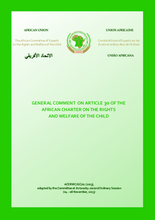The African Committee of Experts on the Rights and Welfare of the Child (ACERWC) held its twenty-second Ordinary Session from 4-8 November 2013 and issued its first General Comment on the African Charter regarding the rights and welfare of children of incarcerated and imprisoned parents and primary caregivers. The Committee has issued the Comment in the process of their review of the reports of States Parties. In the Comment, the ACERWC highlights its observations and recommendations aimed at improving the implementation of the rights of the child where the desired standard of implementation is deemed not to have been achieved.
In the case of children of incarcerated or imprisoned parents or caregivers, the Committee recognizes that the rights of these children under the African Children’s Charter may be violated, particularly due to stigma, trauma from separation, financial hardship, educational performance, and pressure on parents to terminate parental rights. Additionally, the Committee finds that children who live in prisons with their mothers are subject to violations of their rights including psychosocial and health problems.
The Committee, therefore, has issued its first General Comment with their recommendations to States Parties to support the states’ effective implementation of Article 30 of the Charter, which lays out provisions ensuring special treatment of pregnant women and mothers in regards to criminal justice and incarceration, taking into consideration the needs of their children and families and the potential damage of separation. The ultimate aims of the General Comment, according to ACERWC, are to (a) strengthen the understanding of the meaning and application of Article 30 of the Charter; (b) elaborate on the scope of legislation, policy, and practice necessary to implement Article 30; (c) engage in constructive dialogue with States Parties on the effective implementation of Article 30; (d) promote and encourage regular periodic reports submissions by States Parties; (e) highlight positive approaches in implementing Article 30; and (f) enhance cooperation at continental and international levels.
The Committee lays out specific recommendations for aligning with the Principles of the African Charter including the non-discrimination of children; the best interests of the child; the right to survival, protection, and development of each child; and the right to participation. ACERWC also outlines the scope of Article 30 and some areas in which States Parties may fall short of effectively implementing the particular mandates within Article 30 in accordance with the Charter’s principles. Some of the areas in which ACERWC suggests improvements in implementation include: ensuring that a non-custodial sentence is always considered first when sentencing mothers, establishing and promoting measures alternative to institutional confinement, alternative measures for sentencing, establishing special alternative institutions for holding mothers, ensuring that a mother shall not be imprisoned with her child, ensuring that a death sentence is not imposed on mothers, prohibiting the pronouncement of a death sentence for children, and ensuring that the essential aim of the penitentiary system is the reformation, rehabilitation, and reintegration of the mother. The Comment concludes with a recommendation that States Parties disseminate the General Comment and that they issue reports with detailed information, statistical data, challenges, and achievements in the implementation of Article 30 along three indicators: (1) constitutional and legislative measures, (2) policy measures, and (3) implementation mechanisms.

